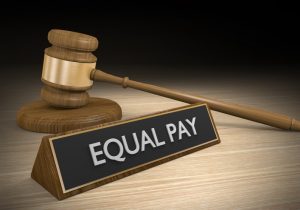 Men, and even women, have from time to time tried to tell me that the wage gap isn’t real. That is a bad idea. I’ve done a fair number of Reductions In Force. I was an employment lawyer on the bottom rung in 2008. I looked at a lot of RIF charts, to summarize them and be sure the layoffs weren’t, on their face, discriminatory. And I can tell you two things from these experiences: (1) women make less than men and (2) this is true in every industry. Sure, there is some hope, but I’m not optimistic.
Men, and even women, have from time to time tried to tell me that the wage gap isn’t real. That is a bad idea. I’ve done a fair number of Reductions In Force. I was an employment lawyer on the bottom rung in 2008. I looked at a lot of RIF charts, to summarize them and be sure the layoffs weren’t, on their face, discriminatory. And I can tell you two things from these experiences: (1) women make less than men and (2) this is true in every industry. Sure, there is some hope, but I’m not optimistic.
Why does an employment lawyer care? Because gender-related wage claims make me more nervous than anything else for my clients. Because it is very common in organizations that do not have female leadership for there to be a real pay discrepancy based on gender. As in 20% or more. Across the board. And given how rare female leadership is, I can guarantee that in 90% of “corporate America,” a gender-related wage claim is a can of worms. I’m sorry to break it to you, women of corporate America, but you make less than the male working alongside you with the same title and education. In fact, you may make less than the men you supervise. And for the average company, this isn’t an issue. Until the EEOC tells them to start giving stats, and things get very embarrassing. As Jay Z says, men lie, women lie, numbers don’t.
One of the reasons gender-related wage claims are particularly frightening is that often the individuals making those decisions don’t even realize it. HR rarely seems to bring this to their attention. Sure, race claims against a very racially homogeneous client make me nervous, particularly when I get the response of “I don’t know what race my employees are.” Because of many many reasons, none of which are worth discussing right now, this should not be true. And age claims are occasionally an issue, but I think that a bright line of 40 and up as the nation as a whole ages kind of misses the picture. For many of my clients, it’s often a time where they realize just how bad they are at guessing ages, especially for employees of color.

Meet Me At ILTACON: Opus 2 And AI Workbench
Swing by Booth 800 for a look at the latest in AI-powered case management.
No, gender-related wage claims are terrifying because they are so often right. While I am often the only one concerned when the issue comes up, employers should be terrified. I’ve seen female sales employees make less for larger books of business. And no, it wasn’t a “risk averse” situation. The base salary was lower. The percentage was lower. Everything was lower. When asked why, the response was: we had no idea.
Women make less than men. In every industry but porn. In every part of the country. I know right now someone is sending me an email telling me how I’m wrong, and how women have babies. But even women without children make less over a certain age and in certain industries.
Recent law firm cases on this matter have shined the spotlight on law. Of course, lawyers make for juicy legal sagas, and this case doesn’t disappoint. And from what we see, it looks like female attorneys make less. In fact, beyond the lockstep system, I am pretty sure that no firm can say they pay female attorneys equal to male attorneys. Whenever discretion comes into play, female employees get paid less, all factors being equal. Sure, there will be reasons for the discrepancy beyond factors of hours, clients, etc., but it doesn’t make it less real.
But the Ninth Circuit, of all places, seems poised to make that an easier choice to support. By the magic of this unbelievable argument: women make less because we pay them less to begin with. Yes. It was that easy.

Paying for Law School in 2025: A Straight-Talk Playbook
Juno has consistently secured the best private loan deals for students at the Top MBA programs since 2018—now they’re bringing that same offer to law students, at no cost. Students can check their personalized offers at juno.us/atl This article is for general information only and is not personal financial advice.
In Rizo v. Yovino, an employee discovered that her employer paid her significantly less than male employees doing the same work. She sued. The employer, a school district, conceded that it paid the female employees less. But it claimed that the discrepancy was based exclusively on prior wages. Not on sex.
Now the employer was careful to follow a formula, allegedly every single employee was treated the same, so they argued (successfully to the Ninth Circuit) that “sex” or gender was not a factor.
Except this is a terrible idea. Women are always paid less. With precedent like this, women will always be paid less. And no, I don’t think this precedent applies to all companies. In fact, it will likely not apply to anyone but this employer. But that won’t stop someone from reading about this and thinking: now I really get to ignore HR’s pay bands! And, this case perfectly illustrates a point I’ve made a few times: lawsuits aren’t going to fix it. Female employees pay a heavy price for rocking the boat. Some particularly progressive states and cities are banning the ability to even ask about prior pay, for just this reason. But that is just a start.
The only thing that will actually fix the issue with gender-based pay discrimination is honesty. People have to start talking about their salaries. Male employees need to share their salary with their female co-workers (as they did in the Rizo case, but in other settings too). Employees need to talk openly about wages and lift the artificial gag order they are under by employers.
Until we have radical transparency with current pay, and until every city and state bans asking about prior pay, it will remain a problem. I will still feel my heart stop the next time I hear “complaining about pay” from the in-house attorney or HR professional when talking about a female employee. I will still read about class action lawsuits on this topic. This is a very real problem for the working world, and it won’t fix itself.
Earlier: You Can Pay Women Less Than Men For The Same Job, As Long As She Was Making Less In Her Old Job
 Beth Robinson lives in Denver and is a business law attorney and employment law guru. She practices at Fortis Law Partners. You can reach her at [email protected] and follow her on Twitter at @HLSinDenver.
Beth Robinson lives in Denver and is a business law attorney and employment law guru. She practices at Fortis Law Partners. You can reach her at [email protected] and follow her on Twitter at @HLSinDenver.